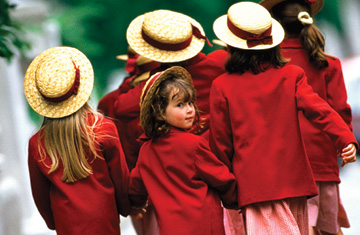
Autumn is not just the season of mists and mellow fruitfulness, as Keats wrote, but also the widening of the class divide. For it brings the start of school, an institution that, particularly in crowded global cities like London, efficiently sorts kids by socioeconomic class. A 2004 study of British schoolchildren by University of Bristol researchers found that the wider the choice of schools parents have, the more segregated pupils are by background. I've seen this firsthand, having just dispatched my youngest child, Nicola, to school.
With her went the freedom to lie in and to wear what she likes. And though she's only four, a subtler, if more profound freedom has begun eroding, too: the freedom to mix with people from other backgrounds. She's headed off to school, in her red-checkered uniform, with the kids of middle-class Londoners, "people like us." We pay fees, but low ones, so the school tends to attract parents in the media, the public sector and small businesses. Our local state schools were too rough, too crowded or too religious, and the school where we'd sent our elder daughter, Julia, for a couple of years was too expensive and snooty. So Nicola's joining Julia at a school that will give her a good education, but, if we're not careful, a narrow view of the world. The students are whiter and more English than at the local state schools, which draw many migrant kids, and at Julia's first school — populated as it is by the children of the international élite. In choosing affordable academic excellence, we've had to sacrifice diversity.
The residents of London may come from all walks of life, but early childhood is one of the few times when the classes mix. The free neighborhood baby-massage courses I attended saw migrant mothers and American corporate types bonding over lavender oil and breast-feeding. At our local northwest London playground, my kids share the swing set with Kosovar refugees and the children of hedge-fund millionaires. Government vouchers for day care broke down class stratifications during Nicola's toddler years. Her classmates were the children of cash-strapped single mothers, middle-class professionals and the rich — a few arriving in chauffeured Bentleys.
But nursery is a false Eden, because class inequalities are already at work. According to a 2007 report by the nonprofit Sutton Trust, cognitive test scores of bright 3-year-olds from the poorest British households drop around 30% by the time the children reach age 5. As kids grow, so does the education gap. The chances for smart-but-poor Britons to reach top universities are slim. A 2006 study for the Bonn-based Institute for the Study of Labor found that Britain had the lowest social mobility of the 12 developed countries surveyed.
The British child who matriculates takes one step nearer to a class ghetto, whether the gated community, the neatly clipped suburb or the council tower block. Nicola's nursery mates are no exception: the Bentley babies have since decamped to schools that charge fees of about $22,000 a year. Those parents pious or savvy enough to attend church have a shot at getting their kids into a state-funded religious school, for decades a refuge of the aspirational classes. Rising private-school fees — up over 40% in the last five years — have triggered a groundswell of faithful behavior. "It's pray or pay," parents mutter to one another. I've attended baptisms of people who may be secularists, but are fervent believers in the right to decent schooling for their children.
Year by year, the embrace of one's class grows tighter. Now six, Julia plays less in the local park, busy as she is with homework, ballet and violin. When Nicola was at nursery, she went to birthday parties in tony private clubs. Uniformed staff served her in a stately ballroom at the Dorchester Hotel. By the time she was three, she had attended probably the most lavish parties she'll ever see, at least while living with us.
Maybe if the markets rebound and my husband and I scrimp, Nicola will head off to a secondary school with people from the Dorchester birthday-party set. We'd defy the odds if she did: a Halifax Financial Services study last year found that the average earner in only 13 professions can afford private school for their kids, down from 23 professions in 2002. Perhaps we'll move to an area where the schools are good, free and nondenominational. Even so, Nicola's schoolmates will probably be middle-class like her: the Bristol University study found that poor children are 30% more likely to attend low-scoring schools than equally bright but wealthier kids. As we middle-class parents scrabble to keep our children in the middle class, many of us have opted for academic standards over the chance to have our kids learn with others from a range of backgrounds. School has become as much a slow shuttering from the world as it is an exposure to it.
